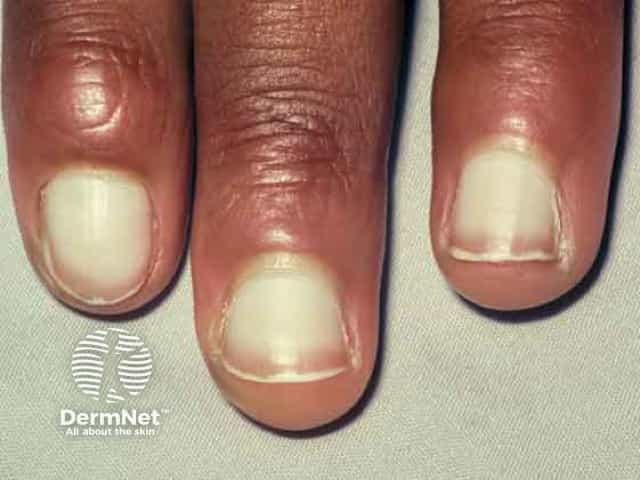Leukonychia
Background
Leukonychia, or white nail, is defined as partial or complete whitening of the nail plate affecting one or more fingernails or toenails. The nail loses its natural pink color, taking on a white appearance. It can be classified according to the underlying pathology, its distribution, or its mode of onset.
Classification according to pathology
- True leukonychia:
- Due to abnormal nail plate keratinisation.
- The white nail will not be hidden by pressure application of the nail plate.
- Apparent leukonychia:
- Secondary to disease of the nail bed.
- Disappears with pressure application on the nail.
Classification according to distribution
Leukonychia can be partial or total.
- Total leukonychia: whitening of the entire nail plate.
- Partial leukonychia: 3 subtypes are described.
- Punctate
- Longitudinal
- Striate
Classification by development timeline
White nails can be acquired or congenital.
- Congenital: Familial leukonychia is more commonly inherited recessively, although dominant patterns are possible
- Acquired: Secondary to systemic disease.
Causes
- Trauma
- Poisoning and drugs
-
- Heavy metal poisoning (eg lead, arsenic)
- Chemotherapy
- Sulphonamides
- Systemic illness
-
- Liver cirrhosis
- Chronic kidney disease
- Heart failure
- Hypoalbuminemia
- Protein-losing enteropathy
- Diabetes
- Iron deficiency (anaemia)
- Zinc deficiency
- Hyperthyroidism.
Diagnosis
History and physical examination are typically adequate.
The following can provide additional insight:
- Nail clippings to rule out fungal infections
- Nail biopsy
- Blood tests to evaluate systemic disease.
Treatment
- Management varies based on the underlying cause.
- Trauma-induced leukonychia has no specific treatment.
- Punctate lesions will disappear as the nail follows its natural growth pattern.
Written by:
Dr. Renad Alkanaan
Revised By:
Naif Alshehri, Medical Intern
Resources:
Dermnet
UpToDate

